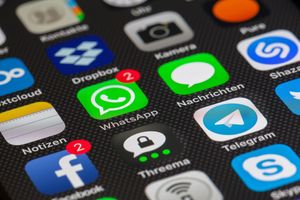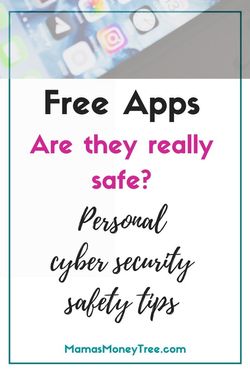This is a guest post by TechWarn.com
TechWarn is a digital safety advocate for cybersecurity companies.

Given a chance to choose between paid and free mobile apps it is easy to go for free services, right? I mean there are many apps out there promising to solve our diet problems, weight loss issues, and so much more. But to what extent is this ‘free’ free?
And are these free apps really safe? Is it true that all the information shared on these free applications comes at no hidden cost?
This article discusses this and much more pertinent cybersecurity safety issues surrounding these applications.
Why you may opt for free apps
Here are some of the reasons why you may opt for a free service;
1. They are no direct charges
It is possible to enjoy the service that a free application offers without paying a cent for it. You are at liberty to download an app, test to see whether you like it or not and uninstall it without suffering any monetary loss.
2. Freedom
With free applications, you are at liberty to switch from one free software to the other. Most free applications do not tie you down with complicated terms and conditions.
3. No mandatory upgrades
You are never really compelled to use the latest versions. Most paid applications become obsolete after a certain period following an upgrade and to continue using them, you have to upgrade to the latest versions.
But is it all rosy with free applications? I am afraid not. So, please, beware.
There are serious privacy concerns associated with some of these freebies. Let’s look at the dangers – these are reasons why you need to avoid free applications like the plaque.
Hidden dangers of free applications
It turns out that that ‘free’ weight loss app might not be free after all.
Here are some of the things that the developers of free apps might be doing in exchange.
1. Hidden malware
Some free applications downloads contain malware that secretly steals your data. Installing such applications on your smartphone exposes the personal data contained therein. It can be your banking information or any other credentials used to access other important accounts.
This is an infringement on your privacy and it’s unfortunate that it happens without your approval or knowledge.
2. Slow response to threats
Many free applications do not offer prompt solutions to emerging threats and concerns. You are not paying for the service anyway.
This low-quality service either leaves you dissatisfied or exposed to threats when a developer cannot release important updates as frequently as it’s necessary to seal any existing security vulnerabilities.
3. Trading your privacy and data
As mentioned above, free applications tend to dig up and collect your information and user data without your consent or knowledge.
Here’s the worst part about it – some free applications share the collected information with third parties.
Here is how this third party data sharing cycle works.
You download and install free software, let’s say a free VPN service to secure your online traffic and to be able to bypass firewalls and other restrictions. The free service that is supposed to protect your online privacy and security has full access to your user data.
The application developer secretly collects your user data and sells it to advertisers.
What for, you ask.
Well, this information is for analyzing your shopping habits, internet searches and other habits. With this information, advertisers can tailor advertisements to match your interests.
I believe that you now understand why your social media timeline is always displaying sponsored posts relating to your most recent internet searches. A service provider is probably leaking your data to an advertising agency.
4. Impersonation
Some free applications go as far as initiating calls or sending text messages to known or unknown numbers without your consent.
Many times, such processes run in the background and result in expensive bills.
5. Unnecessary access permissions
Many free applications want to track your data and activities. Although they might promise not to share the information collected from these permissions with third parties, they end up doing just that.
You will notice some strange permissions like accessing contacts, location, modifications to storage devices, and internet access.
Tips to help you stay protected
It might not be easy to check if an app is actually safe to install. Here are some personal cyber security safety tips that you can implement, to keep away from danger.
1. Choose paid alternatives
If paid alternatives are available, go for them instead of the free services. You stand a chance to get better services when you are paying for a service.
2. Install a VPN
You can also download a VPN to stay protected. And when we talk about a Virtual Private Network, we are referring to paid services. These have spelt out privacy policies that clearly state how much they will access, for what purposes and the security measures put in place to protect it from third parties.
3. Read and understand all the terms and conditions
As they always say, the devil is in the details. Before installing a free application, do not just scan through the provided terms and conditions, read to understand. Especially if there are small prints.
If any of the conditions infringes on your privacy, consider opting-out immediately.
4. Avoid 3rd party application stores
A third party store is any platform selling applications relating to your device, other than the developer of the device or the operating system.
Most third party application stores are a notorious breeding ground for hackers, data stealers and malicious software.
5. Manage app permissions
Review the permissions requested by the applications installed on your phone. There are different types of permissions ranging from access to the internet, contacts, messages and so on but are they even necessary?
Make adjustments to the granted permissions as you deem fit.
6. Install an antivirus
Installing an antivirus is another way to protect yourself against the dangers presented by free applications. With up-to-date anti-malware antivirus, your device will be protected from malware that may be embedded within a free application.
Conclusion
If you must use free applications, make sure that you at the least have an anti-malware antivirus and a VPN connection. This way, you will have the primary security tools to help keep off spies and malicious software attacks which are a common feature for many free applications.
But if there are alternatives, go for the paid services. You do not want to lose your privacy just to avoid spending a few dollars. Once exposed, your privacy could cause way more severe damage.

Related: Some malicious free platforms that I have come across include
– GlobalRTX
– RewardDollars
– CashForShare
– CreateBucks
– PlentyBread
